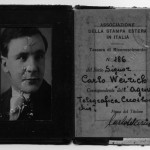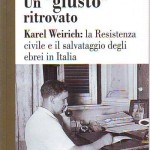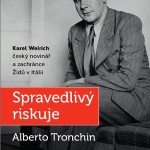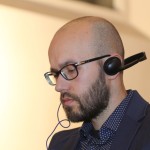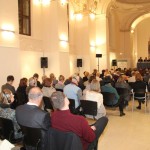The life of an Italian-Czech journalist, who during the war did his utmost to save the Jews – who had been interned in Italy – from the Holocaust. The Italian Cultural Institute in Prague, in collaboration with Gariwo, has just presented the Czech translation of the book by the historian Alberto Tronchin
An extraordinary story, similar to that of Giorgio Perlasca, Oskar Schindler and Nicholas Winton, and which, like their story, remained almost unknown for more than half a century. We are talking about Karel Weirich, a “partisan journalist”, who thanks to his role as Vatican correspondent for the Czech News Agency ČTK, and his contacts within the Holy See, was able, during the Second World War, to help and save many Jewish Czech citizens that had been interned in Italy.
“A rediscovered righteous”, as historian Alberto Tronchin points out in his book, who traces his intense and busy life, divided between his typewriter and his civic commitment. It was Tronchin, in fact, through his research work to prevent the figure of Weirich from falling into oblivion. “Fundamental – he recounts – was the fact that I knew his niece, Mrs. Helena Weirichová. As soon as she started showing me the documents that her uncle had preserved, I almost turned pale. I realized immediately that it was an important story that had to be told”.
Released in Italy in 2007, the volume has now just been presented in Prague, in Czech, (Spravedlivý riskuje, Edizioni Carmelitane), thanks to the initiative of the Gariwo (Gardens of the Righteous Worldwide). Led in Prague by the Italian journalist Andreas Pieralli, Gariwo aims – as was the case in other cities around the world – to establish in the Czech capital a “Garden of the Righteous”, i.e. a place dedicated to those heroes, who on their own initiative, opposed all crimes against humanity and all forms of totalitarianism.
 But let’s take a step back to the story of Karel Weirich. A true Italian-Czech citizen, born in Rome on July 2, 1906 and the son of a Czechoslovak artist, Ignaz, arrived in the Italian capital thanks to a scholarship. At the age of nineteen, after being awarded a diploma in bookkeeping and shorthand, Karel is offered a job as secretary at the National Directorate of the Pontifical Society of St. Paul the Apostle.
But let’s take a step back to the story of Karel Weirich. A true Italian-Czech citizen, born in Rome on July 2, 1906 and the son of a Czechoslovak artist, Ignaz, arrived in the Italian capital thanks to a scholarship. At the age of nineteen, after being awarded a diploma in bookkeeping and shorthand, Karel is offered a job as secretary at the National Directorate of the Pontifical Society of St. Paul the Apostle.
As collaborator of the Messaggero newspaper, a few years later he is transferred to the National Directorate of the Pontifical Mission Societies, where he starts posting articles on Czechoslovakia for the Osservatore Romano. It was, in fact, this Catholic missionary activity – and his being part of the editorial staff of the newspaper of the Holy See – that allowed him to become acquainted with several prominent figures in the Vatican, in particular the Secretariat of State and the then deputy Monsignor Giovanni Battista Montini – the future Pope Paul VI.
His collaboration with the ČTK, the Czechoslovak national news agencies, dates back to 1935, when he was offered a job as a full time collaborator to the Holy See. Weirich accepted, while continuing to work for the Vatican newspaper: a way to continue refining his contacts in the “two homelands”.
Following the release of the book, that traces his history, it is actually the Osservatore Romano, his old newspaper, that remembers him with these words: “he tried to help by sending them money, clothes, medicines and even forged documents. But, unfortunately, not all of them were able to save themselves. However, for a good number of them, their encounter with this generous and courageous compatriot, led to their safety”. His list contains the names of thousands of Czechoslovak Jews, that Weirich undertook to help during the conflict and for which he paid the consequences by being arrested and deported to Germany.
The “Weirich’s list” – as someone has called it, by paraphrasing Schindler’s List – is now a valuable historical document for reconstructing the whole story. It was he, in fact, who saved this document by hiding it inside the staircase of his house, before being arrested by the Gestapo in 1944.
But let’s take a step back in history. It was 1941, and Czechoslovakia had been invaded by the Nazis and “transformed” into the Protectorate of Bohemia and Moravia. Weirich, who worked in Rome for the national news agency of Czechoslovakia, refused to swear allegiance to the German Führer – and was thus dismissed.
The loss of his job did not stop him from keeping in touch with the Czechoslovak anti-Nazi circles and obtain despatches to be sent directly to Pope Pius XII. However, the position of the latter during the Second World War is still rather ambiguous, and particularly regrettable is the lack of a clear cut position against Nazism and the persecution of the Jews. However, as Alberto Tronchin explains, it seems that “the Holy See was surely aware of Weirich’s activity, as may be deduced from the correspondence he had with influential members of the Vatican (Montini, in primis).
The impression is that they actually knew in great detail what Weirich was doing”. What is really certain is that locally the interreligious assistance between the Christians and Jews did actually took place, Tronchin goes on to explain: “In several texts they even talk about widespread help from ecclesiastical bodies or, sometimes even from religious individuals, involved in helping people of Jewish religion. Many Jews were given refuge and hidden in convents and monasteries in and around Rome”. It was with these institutions that Weirich maintained an extensive network of contacts, often making sure that the Jewish Czechoslovaks living in Italy would find refuge. In 1940, after the order of arrest of all the Jews by fascist Italy, the Italian-Czech journalist founded, together with a few compatriots, the St. Wenceslas Mission, which was named after the Czech king and patron saint. It was also through this association that he was able to assist many of those who had already been interned in camps. The underground work of Weirich focused particularly on the internment camp of Ferramonti-Tarsia in the province of Cosenza. This prolonged underground activity, as well as his role as reference for the Czechoslovak resistance – which became effective alongside the partisans after September 8 – led to his arrest in 1944 and the death sentence by a Nazi military court.
It was only thanks to the intervention of the Holy See that he avoided being executed: the sentence was commuted into a period of detention in the prison of Sadelheim in Munich and to eighteen months of hard labour, to be served at the Kolbermoor concentration camp. He remained there until May 1945, when he was freed by US troops. After the war, Weirich was able to take up his post as ČTK correspondent in Rome, at least until the communists took power in Czechoslovakia, when he was once more dismissed on charges of being a spy. He then found refuge again in Rome, where he lived until 1981, always maintaining a humble profile, despite his outstanding accomplishments.
On October 28, on the National Day of the Czech Republic, Weirich was awarded a Medal of Merit, in memory of his deeds. When he was still alive, and a request was been made for him to be decorated for his accomplishments, he replied with these simple words: “we should therefore give a medal not only to me, but also to all the monks and nuns that gave refuge and hid those people, thus saving their lives”.
by Edoardo Malvenuti





